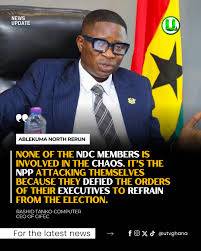âš ï¸ Chaos in Ablekuma North: What Happened
On July 11, 2025, a parliamentary rerun in the Ablekuma North constituency was marred by violent scenes at St. Peter’s Methodist Church polling station. Armed and masked assailants stormed in, attacking voters, political agents—including NPP candidates Nana Akua Afriyie and former MP Mavis Hawa Koomson—and journalists such as Salomey Martey, Jude Duncan, and Vida Wiafe . Voting was briefly halted and later resumed under heightened police presence.
Ewurabena Aubynn of the NDC was ultimately declared winner by a slim margin: 34,090 to 33,881 votes .
🎯 Blame Game: Who’s Responsible?
1.
Political Party Vigilantes & NDC Organisers
- The Electoral Commission (EC) publicly accused supporters of the NDC, led by its Greater Accra Regional Organiser, of orchestrating the attack. They claimed individuals in military-style uniforms spearheaded the violence .
- NDC-aligned voices dismissed this, pointing to a broader trend of political vigilantism by both major parties—a symptom of desperation among unemployed youth and underfunded campaigns .
2.
Security Lapses: Ghana Police Service in the Dock
- Tony Aidoo, a former presidential adviser, lambasted the police for “apparently standing by doing nothing,†suggesting passivity possibly due to political influence or internal directives .
- The Daily Graphic Editorial echoed that criticism, decrying deployment of unarmed or unprepared officers despite prior intelligence .
- EC reports said the police had warned about security risks but failed to act decisively, leading to threats, property damage, and staff fleeing .
3.
Electoral Commission: Procedural Missteps
- Critics, including Col Aboagye, slammed the EC’s decision to rerun voting in 19 polling stations “without clear justification†and poorly communicate the process—actions that intensified tensions .
- These administrative missteps stoked public distrust and created openings for manipulation.
4.
Victims and Political Fallout
- Prominent figures—Nana Akua Afriyie, Mavis Hawa Koomson, and multiple journalists—were targeted, signaling a collapse of electoral safety norms .
- NPP voices like Akosua Manu condemned the violence, noting that no perpetrators have been arrested, and accused the NDC and government of silence, equating it to complicity .
- Dr. Bawumia added political pressure, urging President Mahama to ensure quick action and accountability .
📉 Broader Implications: Ghana at a Crossroads
- The Daily Graphic warned the violence is “a stain on our democratic credentials,†urging swift prosecution for perpetrators across party lines .
- This incident resembles past flashpoints—Ayawaso West Wuogon (2019) and Akwatia—highlighting entrenched electoral violence .
- Experts stress the need for institutional reform: clear accountability for party militants, vetted and apolitical police forces, and a more transparent EC .
✅ Conclusion: Who Should Take Responsibility?
- Primary responsibility lies with political thugs—whether organised by parties or autonomous—whose actions directly undermined the vote.
- The Police share blame for inadequate and uneven responses amid a volatile election climate.
- The EC bears a degree of fault for triggering mistrust through procedural and communication errors.
- Lastly, political leaders on both sides must stop condoning or ignoring violence, lest Ghana’s democratic stability unravels.
If Ghana hopes to maintain its status as a model of democracy in West Africa, decisive justice, institutional reform, and unwavering political condemnation of such events are non-negotiable.




No comments yet
Be the first to share your thoughts!